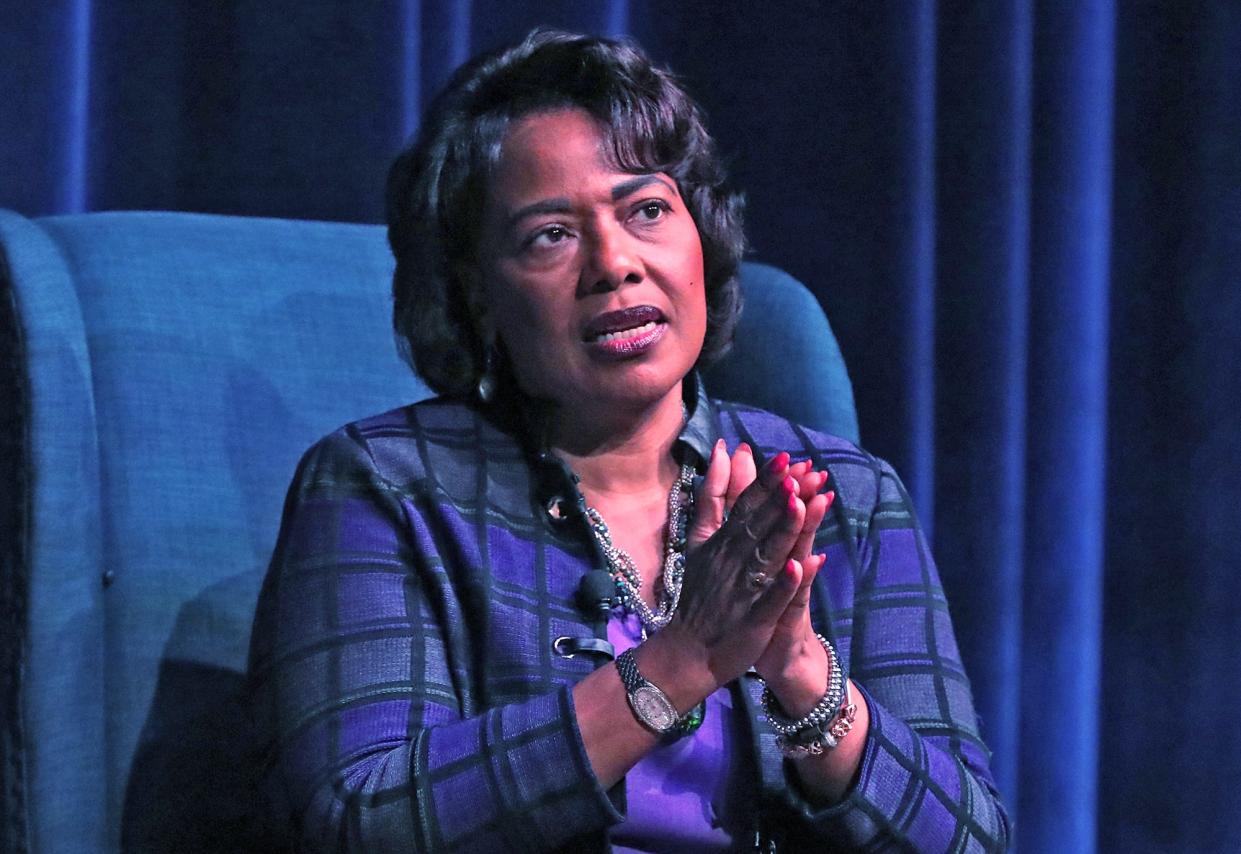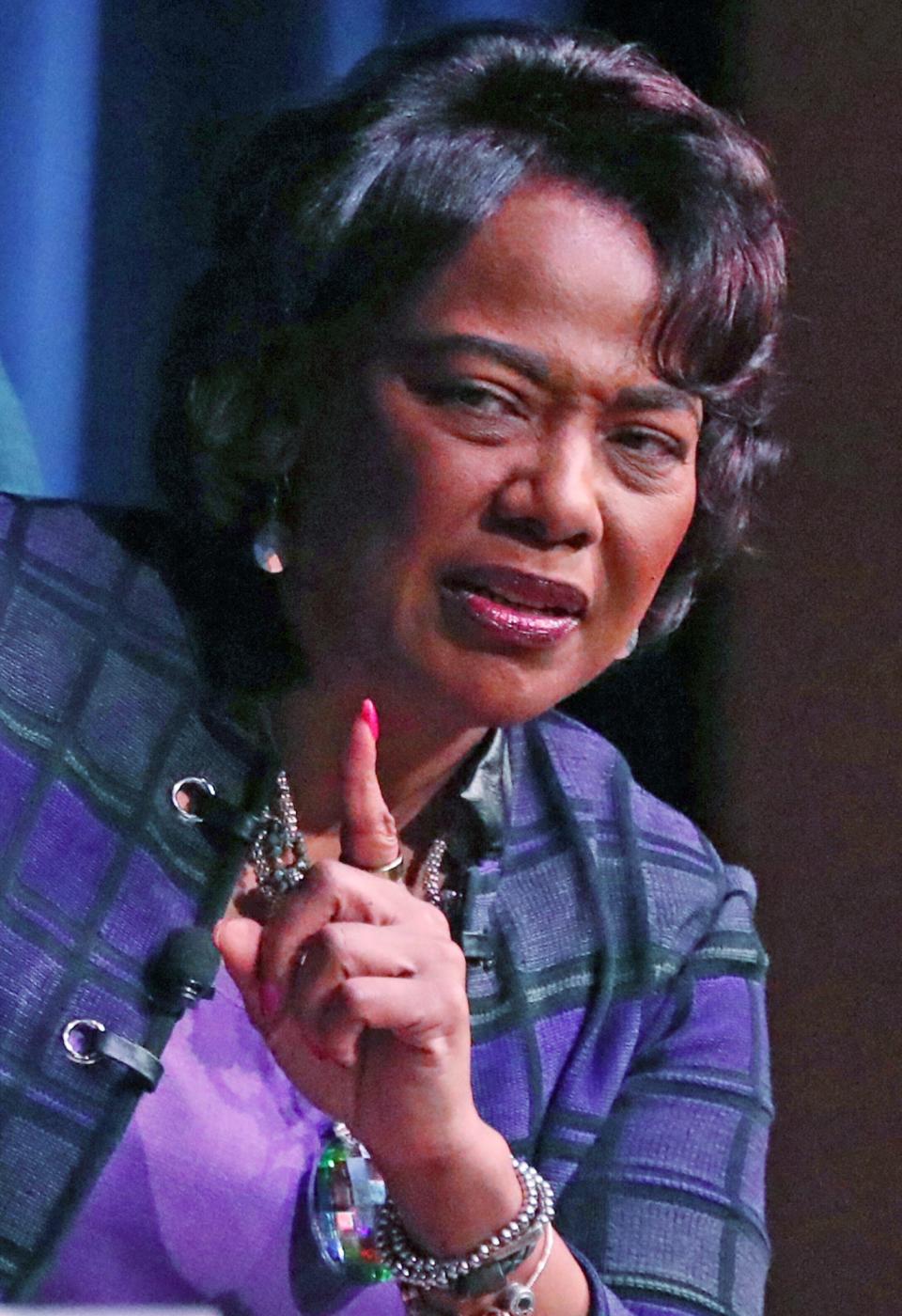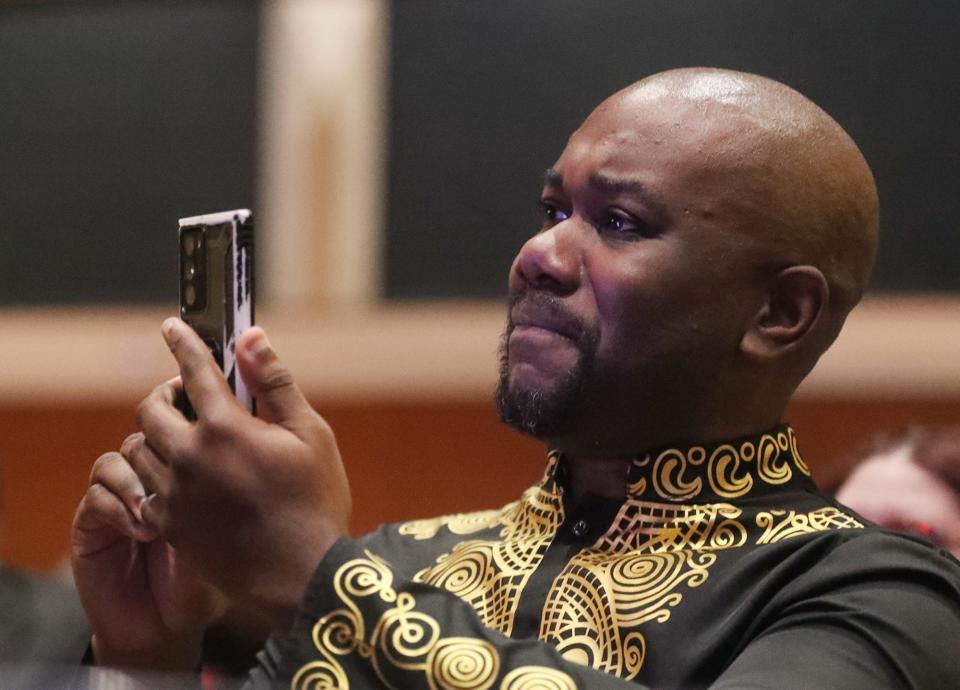Bernice King urges KSU audience to keep working toward MLK's dream of harmony

- Oops!Something went wrong.Please try again later.
- Oops!Something went wrong.Please try again later.
- Oops!Something went wrong.Please try again later.
Bernice King was only 5 years old when her father, the Rev. Martin Luther King Jr., was assassinated in Memphis.
So it's only natural that the three pieces of parental advice she remembers most from growing up in a family at the forefront of the civil rights movement came from her mother, Coretta Scott King, she told a Kent State University audience Thursday.
The first was to always arrive at a course of action with a clear head — "never make a decision when you're angry."
The second was to be herself — a task that could be difficult for her because of her parents' outsized legacy.
"She would always say to me, 'Look, I want you all to know that you don't have to be me, you don't have to be your father, but whatever you do in this life be your best self,'" King said.
Her mother's third entreaty was to "cut off the chain of violence." Kids naturally get into fights with their siblings, she said, and the King household was no exception. The difference is that she wasn't ever told that she should meet the others' aggression with hostility of her own.
About 700 people gathered in the KSU Student Center ballroom to hear King relating her experiences at the keynote event for the university’s 53rd annual Martin Luther King Jr. Day celebration.
Professor Uma Krishnan, the English department's associate writing program coordinator, moderated the discussion as King explained how nonviolent resistance was a way for her father to channel negative emotions — hurt, frustration and pain — into constructive efforts for change during the civil rights movement of the 1960.
"There is a way to address violence," King said, "but I don't have to feed into the violence."
Each generation is called to push for change, Bernice King explains
During the hourlong conversation, Krishnan prompted King to talk about what it means to be Black in America — and when she expects to see her father's hopes for racial harmony come to fruition.
In answer to the last question, King said she was reminded of something her mother told her.
"She said the struggle is a never-ending process," King said. Her mother told her each generation is called to contribute to the struggle — each working with the next to take a bite out of the problem.
King urged younger generations to find small victories in the larger fight. Trying to get everything all at once will only burn you out, she said, citing the current effort to address unfair policing in America in one go, a problem so large and multifaceted that she describes it as a "monster." She said she admires the effort that people have put in to the problem, but she wouldn't focus all her efforts there because of how much of an exhausting uphill battle it is.
Energy, she said, should be directed as well at crafting federal legislation to address the problem, but that the quest for a solution doesn't end with one law.
"We've got to look at some of the other things that feed into this kind of stuff," King said. "That's why the education system is so important ... we've got to really fight hard to make sure that people are being raised in a way that they have all of the truth, and not one perspective."
When Krishnan asked King how she keeps herself composed, King said that she knows if she lets her emotions run away with her she turns into a "character" that she doesn't like. When the going gets tough, she takes a few breaths and visualizes the outcome she desires.
As an example, she talked about her experiences with the ongoing issue of police brutality.
The way that American police (not all police, she added) interact with Black communities frustrates her, she said, citing George Floyd's murder at the hands of Minneapolis police, Breonna Taylor's death during a no-knock raid on her home is Louisville, and the more recent killing of Tyre Nichols by Memphis officers.
"It'll get deep down underneath everything and make you want to do more than holler," King said. She sets parameters for herself though to keep those impulses in check, and urges others to do the same.
"If you know you're not strong enough emotionally, certain things you shouldn't take in, you shouldn't absorb. You have got to manage what comes into your eyes and your ears — you have to because you're going to be a mess if not," said King.

Bernice King has two distinct ways to describe being Black in America
To Krishnan's question about the Black experience in America, King said she had two answers based on who is asking.
If the inquisitor is not Black, she tells them, "It's hell being Black in America."
King said that when she's going about her day, she's hyperaware of her surroundings — especially in predominantly white environments.
During her time in college she found herself in a class where she was one of two Black students in a room of close to 100 students.
"I felt like I was carrying the weight of the Black community on my shoulders, because as a Black person when I mess up, all Black people (mess up)," she said to applause and murmurs of agreement from the crowd.
When driving through the South, she finds herself praying that she doesn't get pulled over and worrying about what could go wrong.
"It doesn't matter what class you are, doesn't matter what celebrity status you might be, you're still Black," King said.
If the question of the Black experience comes up from a fellow Black person, however, King has a different answer prepared.
"I sum it up this way: 'America is because we are,'" King said. She said that she'd seen a post on social media inviting readers to imagine a world without all of the things that were invented by Black people.
"There is so much that Black America has contributed to this nation that it blows your mind," King said. "Almost everything that's been significant in our society, and yet most people don't know about."
Audience draws inspiration from Bernice King's experiences

After King finished speaking, she ascended to the ballroom balcony to sign books for audience members.
In line was Kent State graduate student, military veteran and Akron resident Deonte Carter.
Carter said that hearing King speak about America's policing situation and how she has dealt with it herself was "sadly reaffirming." Carter had a fearful interaction with the State Highway Patrol in 2017.
"I got pulled over at a Circle K at the corner of Archwood and Arlington," Carter said. "I didn't see the flashing lights and I was getting ready to get out of the car, this cop had his weapon drawn." The officer told him to get back into the car and began asking Carter "dehumanizing" questions, insinuating that the car was stolen, that Carter was drunk.
After the interaction, Carter said he was left feeling afraid to even leave the house even to get the necessities for himself and his children.
"To be constantly on guard, as Dr. Bernice King had mentioned, that's how I feel sometimes," Carter said. "My head is constantly on a swivel, figuratively speaking. Is there a police officer that's going to stop me, is this my last days in society?"
Carter said he came away from the event with the urge to continue advocating for underserved communities, and to continue taking a stand against those in society who think being racist is acceptable or normal. It reaffirmed his desire, he said, to be an agent of change in the world.
Kristal J. Moseley, a KSU student and member of Black United Students, said the presentation filled her with hope for herself and her organization.
She said Black students on campus could be "stronger in terms of the community being unified and showing up for each other."
"Trying to figure out how to do that ourselves is kind of hard because we're students and this is a learning process for us," Moseley said. "So hearing someone who has been through, and still living through, the fight for civil rights and the fight for equality and justice, and getting the Black community more unified, it was encouraging to hear her speak."
Contact reporter Derek Kreider at DKreider@Gannett.com
This article originally appeared on Akron Beacon Journal: Bernice King urges Kent State audience to embrace MLK dream of harmony

